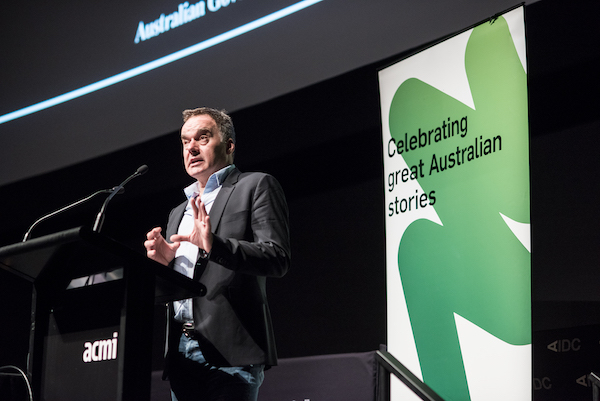Graeme Mason.
The message of Screen Australia CEO Graeme Mason’s keynote address to the Australian International Documentary Conference (AIDC) was simple: adapt or die.
Despite significant budget cuts, Mason said Screen Australia had tried its best so far to insulate on-screen funding by trimming costs and staff.
However this financial year will see the agency’s direct on-screen funding drop around 6 per cent across the board. Mason said Screen Australia will, as a result, have to start saying no to projects it perhaps would have backed in the past. In response, filmmakers need to consider what that means for their businesses.
“If your funding model for your project, or worse, your entire business, relies majorly on federal and state funding, then you are not coming from a position of strength, or in most cases, logic,” he said.
“We do know that times are tricky elsewhere here in Australia. The ABC and SBS have their own funding challenges, and are, just as importantly, adjusting their production and distribution priorities as well. And the TV programming landscape is changing, with some documentaries finding that the door they used to fit through has changed shape – or slammed shut.”
Mason stressed the distinction between funding reductions and priority changes around what sort of projects get funded.
“The first is a clear challenge for you to work through, around and overcome. With the latter, It may well be that the type of program or its format is simply no longer viable for the key funders and distributors and, most importantly, the rapidly changing audience viewing patterns. In which case, you and your project should adapt – or drop it and move on to something else.”
The executive urged delegates to look at the success of their peers – citing the box office wins of Sherpa, Embrace and Chasing Asylum – and to learn from them in terms of form, format, audience engagement, coverage, distribution and particularly, funding.
“We don’t see fewer opportunities for you and the stories you want to tell. We see more, and bigger, opportunities. They might be harder to grasp, particularly if they’re unfamiliar. But the rewards are so much greater now than they have ever been. If you have a niche story, you can tell that story to millions.”
Mason urged producers to think about creative ways of delivering projects to audiences and getting income back at the same time – with partnerships key. He pointed to examples like Media Stockade’s community engagement with Call Me Dad, or Stranger Than Fiction’s TV and feature cuts on David Stratton: A Cinematic Life.
“These projects are working outside the usual systems. They offer something people want, in a way they can access it and pay for it. Think the same way, domestically, and internationally,” he said.
Documentary and factual has seen success within new formats and platforms, and Screen Australia plans to continue to divert resources to that area.
“As traditional TV and film distribution plays increasingly to an ageing demographic, we will want to, and be required to, look at things that speak to younger Australians. So if you are still thinking in an old-school way, you will be working in an ever-shrinking pond,” said Mason.
Mason said he was after projects of high quality and cultural value with a clear path to audience. They also had to be innovative, diverse and ambitious –with Kitty Green’s innovative approach on hit Sundance doco Casting JonBonet one recent example.
“With applications up and funding levels down, we will apply those filters now more than ever,” he said. “If you want more than the Offset or PEP funding, it is not a given: you need to come to us with a project that meets those reasons to give out taxpayer money.”
Even if projects tick all the boxes, Mason conceded the agency may sometimes have to turn them down in order to deliver a balanced slate.
“We have to choose, and do the best we can to cater for a range of content and viewers. That’s why we exist: the audience. We are not here to keep you in business. So please know that we will give you and your projects the best chance that we can – but that’s all we can promise. So please: think beyond us and think business,” he said.
“A simple example: are you looking at what’s working on commercial broadcasters and adapting your slate? Islands of Oz worked with Martin Clunes, so why not look at the success of 800 Words and see what New Zealand-based stories you could pitch to Channel 7?”
It’s not Screen Australia’s role to ensure producers adapt, said Mason.
“It is your responsibility. Being almost as blunt as Brian Rosen a few years back, if some of you disappear, the sector is not going to notice or be lessened – there are so many working in the space. It is up… to you, and you alone, to maintain your own viability by adapting and finding ways to get work made for an audience.”
You can read the full text of Mason’s speech here.



